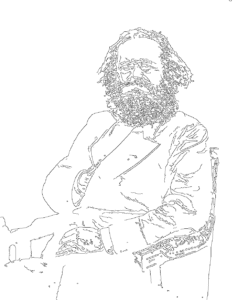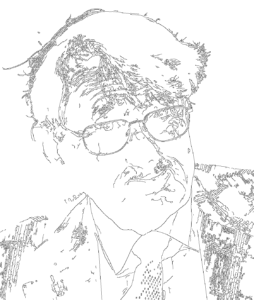Mikael Spång is a professor in political science at the Department of Global Political Studies at Malmö University. He teaches in human rights and democracy. In 2017 he published a book with the title “Emancipation, Democracy, and the Modern Critique of Law: Reconsidering Habermas” in which he addresses the dialectic of law as an instrument of both emancipation and domination.
P&H: Hello Mikael and thank you for taking the time to share some insights into your research with us. Let’s start with a simple question, that will reveal something about your professor-persona. Between Niagara, Gäddan, and Orkanen, which is your preferred building and why?
M: Out of the current buildings, I think that Niagara is a nice and beautiful building, but it is not the most functional building. It is very nice to have such a big atrium, but from a functional point of view it is a confusing way of having a building in which you take away all the floors that you could use for lecture space and office space and so on. I think it is also a problem that the construction is that you have locked sections where students may not enter.
P&H: Would you like to say something about your book before we dive into more specific questions?
M: The basic argument is that law is both condition for freedom and for domination and that this is relevant for discussing, for instance, rights. And to that extent, I address what I call “the modern critique of law”, which is partly relating to Hegel and partly to Marx. This critique concerns such dialectic of law and addresses a certain history of law that one would need to take into account. But it always runs into the problem of seeming to be reductionist in its argument. Either that law and rights become a sort of semblance—that is something which glosses over inequalities and relations of power—or in some historical or theoretical sense it gets reduced to the base superstructure construction. But these problems, I think, are not reasons to ignore the relevance of that kind of critique.
So that is really the background for writing it in this way. Additionally, I worked a lot with Habermas’ theories for my dissertation and onward. It’s been a very important set of theorisations—Habermas more specifically and the Frankfurt School in the broader sense. And I thought that Habermas’ analysis in The Theory of Communicative Action is pointing to something quite relevant, when he talks about “the colonization of the lifeworld”. But he fails to address this in his later work Between Facts and Norms.
P&H: You just mentioned that your critique builds on that of Marx. Could you summarise Marx’ main point when addressing the dialectic of law?
 M: First of all, my two main examples are Marx and Habermas. Marx addresses the problem of labour contract, in the private law context, whereas Habermas addresses the problem of welfare state law.
M: First of all, my two main examples are Marx and Habermas. Marx addresses the problem of labour contract, in the private law context, whereas Habermas addresses the problem of welfare state law.
For Marx the labour contract is a condition for freedom, in one sense. That lies partly in the idea of the contract itself, being between free and equal parties and in the historical transformation, where the transition to the labour contract—a defining characteristic of the capitalist mode of production—means a transition away from largely forced labour.
But then at the same time, there is the exploitation of workers within the capitalist mode of production. And in the labour contact this exploitation finds a legal basis. So, the labour contract is enabling the form of exploitation in a capitalist mode of production where labour is free. And that is the key thing: it is free but exactly that is also a constituting aspect of exploitation. You can’t say that labour is inherently free and exploitation is something that comes afterwards, depending on certain factors and circumstances.
It is something which has a legal basis and that means that one needs to attend to this enabling of exploitation.
The second point to keep in mind is that Marx is talking about this mostly in a private law context. He claims that in this sort of contract, where you have equal rights, it is force or power that decides. When Marx seems to be very, very skeptical of rights, we need to have in mind this exact context. Because otherwise one doesn’t understand why he is so critical, thinking that rights have a very limited value in terms of emancipation. That is sometimes taken—from our contemporary point of view—to be a certain Marxian scepticism of rights. There is a famous essay by Steven Lukes titled Can Marxists Believe in Human Rights?, but this is not the question. It is not whether Marx believed or didn’t believe in this kind of rights, instead he is trying to analyse how do they function within that context.
P&H: So where exactly lies the importance of considering private law, as well as public law, when we talk about rights?
M: I think this reading of Marx, as a question of whether Marx believed that rights are emancipatory tools or not, is a reading that considers rights from within a public law understanding and then reads that back as if Marx’ context was the same. And it is not the same.
The other thing is that when we want to understand how rights, including human rights, were formulated, we need to pay attention to two things: One is that rights have a history that is a private law history. The other one is that through a historical transformation from the dominance of private law to one of public law—through legislation and partly through collective bargaining—the labour contract is modified. So by the late 19th, early 20th century comes this idea that these parties, the workers and the capitalists—even though it’s not just these two—are in fact not equally powerful and we need to intervene through public law to regulate that contract in such a way that it regulates contracts for the workers. That means various forms of workers’ rights. And that transformation means that you start to dismantle this whole package and as such you enable a transformation where you can start to formulate something on the basis of public law.
P&H: And this is then where various labour rights and social rights enter the scene?
M: Yes, and all kinds of rights. It’s a whole slew of transformations. So what one begins to consider is, let’s say, what was called “public utility”—things like water provision or railways. If we look in the mid or late 19th century most of this in many European countries was privately owned. And then the situation arises that all of these private corporations are now providing something which is supposed to be enjoyed by the public. Regulating these things through public law is part of a very broad transformation that involves privately owned corporations performing public functions. Then you have another big chunk, which is the labour rights, and then comes what we call “social rights”.
P&H: Do you think Marx would be happy about these regulations we now find in public law? Would he be less critical?
M: Yes, sure. But we may note that traditionally Marxists have huge problems to make sense of what we call “the welfare state” and social rights and so on, because they seem to run counter to not only the theorisation that you find in Marx, but also the prognoses he made. He foresaw what were likely developments of capitalism—that the impoverishment of workers was going to continue and be exacerbated—and for many people in the working-class movement in the late 19th early 20th century this starts to no longer make much sense. You don’t really see that severe impoverishment—at least of certain sections of the working class it actually seems to be the opposite. You don’t really see the polarization of two major classes and the disappearance of different classes that would eventually lead to an opposition between workers and capitalists. Again, it seems to be the opposite. Sure there is the disappearance of a strong peasant class in a lot of European countries but there is instead the rise of middle classes of different kinds.
So that might not be really answering your question. But if you want to understand a background for the formulation of what we call “reformism” within the labour movement, it is quite important how a lot of people from the late 19th century start to question these development tendencies. Besides a lot of other questions about strength, tactics and strategy and so on, this seems to play a role for a shift where eventually, not all but many, labour movement organizations would endorse this idea of social rights and welfare, even though they initially didn’t.
P&H: Perhaps this is making the best of the situation that presents itself. If the revolution isn’t coming you might as well work concretely with what you have.
M: Yes, and this becomes very important for many reformists. You need to show that you are doing something that produces tangible results in an ordinary situation.
P&H: You write that “the understanding of the political community as a legal community has played a key role in much of modern thinking about politics.” Do you think that there could be something problematic with this overall legal approach, perhaps that we are too quick in framing everything within our society through rights and freedom?
M: I think it is a characteristic and more of an observation. It certainly means that you understand the political community in a specific way. If you then consider the role of rights in that context there is a question concerning how much of the background to that—including private law—do you inscribe actually in the political community? If we think of a modern understanding of political community a lot of people don’t want to talk so much about, let’s say, the capitalist means of production or other problematisations of modern society. But obviously they are connected. The question is then, in which ways can you trace such a connection? One of the ways you can do it—though not the only—is through the idea of a legally constructed community as such. The question there, I think, is not so much what are the alternatives to that? but rather what are the consequences? Often we get this attitude that if you come with any sort of criticism you need to present alternatives. This is short-circuiting. It is short-circuiting the critical question which is asking what the consequences are.
P&H: Habermas is in the title of your book, so he deserves at least some attention here. You criticise him for giving law too much credit when it comes to emancipation of the individual. He does address—although in your view not persistently enough—something that he calls “the colonisation of the lifeworld”. What does he mean by this?
 M: Marx and Habermas are similar in their criticism of the dialectic of law, although they are addressing different contexts. Welfare state law is emancipatory, for instance—if you keep to the Marxian question—vis-a-vis dependence on wage labour. For Habermas law dominates through normalization. This isn’t as sophisticated as the account of normalization that you find, for instance, in Foucault, but it is pointing into the same direction. Normalization here means that the individual becomes a beneficiary of rights but only in a specific standardized way.
M: Marx and Habermas are similar in their criticism of the dialectic of law, although they are addressing different contexts. Welfare state law is emancipatory, for instance—if you keep to the Marxian question—vis-a-vis dependence on wage labour. For Habermas law dominates through normalization. This isn’t as sophisticated as the account of normalization that you find, for instance, in Foucault, but it is pointing into the same direction. Normalization here means that the individual becomes a beneficiary of rights but only in a specific standardized way.
This, according to Habermas, is due to a lack of involvement of those who have rights, in the process of drafting rights. That’s a very common criticism of bureaucracy: Bureaucracy offers this one size fits all approach from which one can select. This constructs a certain life pattern as “normal”, where other situations become a problem in terms of addressing or dealing with them. We can think of people with several different medical conditions. These often have more difficulties in the healthcare system, because usually, there is a certain way of how medicine and healthcare works. And if you then have two, three, four conditions, you are treated by one specialist on this, by another on that, and by third on the third thing. But taking into account these combined is something, then, that one would be less able to do. And that is, in a way, a form of colonization. You have a way through which administration can work with something and that constitutes the de facto right of certain people with multiple conditions, for instance, to healthcare.
I think Habermas is doing an important job with this problem in The Theory of Communicative Action. He says that the welfare state is “dilemmatic” in itself but then he retracts from that position. There may have been good reasons for him to reconsider the way he is thinking about colonization, but he doesn’t really bring aboard that problem in Between Facts and Norms. That is my basic “complaint”. He is not taking his own analysis seriously enough when he wants to construct the legal basis for democracy and the democratic community. And he reformulates his own problematization into one that fits the legal construction, namely as a question of factual and de jure equality.
P&H: You emphasise the limits of the legal medium as a means for acquiring political autonomy. Can we overcome these limitations and if yes, how? Sorry for asking you for alternatives, which you clearly criticised earlier on.
M: I think if I knew about alternatives, I wouldn’t be writing a book like this. I would try to do something instead or work with that in other ways.
P&H: Whom would you rather have over for dinner, Marx, Hegel, or Habermas?
M: Well, Habermas is still alive so that is one reason for why I would like to have him over. I also have some questions to him.
P&H: Is there another philosopher or sociologist that you’d invite to join?
M: To pick someone very different, maybe I would like to have Spinoza for a visit. He seems like a fascinating person.
P&H: Thank you for your time, Mikael, and some insightful answers! Take care
Photo credits:
Karl Marx | Карл Маркс, 1875, by Olga, modified under CC BY-SA 2.0
Jürgen Habermas, by Wolfram Huke, modified under CC-BY-SA-3.0







